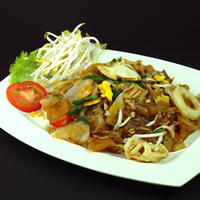
1 serving (300 grams) contains 380 calories, 10.0 grams of protein, 15.0 grams of fat, and 50.0 grams of carbohydrates.

Log this food in SnapCalorie

Nutrition Information
Calories |
299.2 | ||
|---|---|---|---|
% Daily Value* |
|||
| Total Fat | 11.8 g | 15% | |
| Saturated Fat | 2.4 g | 12% | |
| Polyunsaturated Fat | 0 g | ||
| Cholesterol | 39.4 mg | 13% | |
| Sodium | 629.9 mg | 27% | |
| Total Carbohydrates | 39.4 g | 14% | |
| Dietary Fiber | 2.4 g | 8% | |
| Sugars | 3.9 g | ||
| protein | 7.9 g | 15% | |
| Vitamin D | 0 mcg | 0% | |
| Calcium | 31.5 mg | 2% | |
| Iron | 1.6 mg | 8% | |
| Potassium | 157.5 mg | 3% | |
* Percent Daily Values are based on a 2,000 calorie diet. Your daily values may be higher or lower depending on your calorie needs.
Food Attributes
Source of Calories
About Char kuew tiaw
Char Kuey Teow is a popular dish originating from Malaysian and Singaporean cuisine, celebrated for its rich, smoky flavors imparted by stir-frying over high heat. The dish features flat rice noodles, wok-tossed with ingredients like shrimp, egg, bean sprouts, Chinese chives, and often slices of Chinese sausage or cockles, all coated in a savory blend of soy sauce. Typically cooked in pork fat, it delivers bold, satisfying taste but can be high in calories and saturated fats. While it provides protein from seafood and eggs and some fiber from vegetables, its heavy use of oil and refined noodles makes it less ideal for those watching their fat or carb intake. Variations using leaner proteins and less oil can offer a healthier twist. Char Kuey Teow is best enjoyed in moderation as part of a balanced diet.



